Thomas James Richards, Diaries, Transcript Vol. 3, 26 January to 8 November 1916 - Part 11
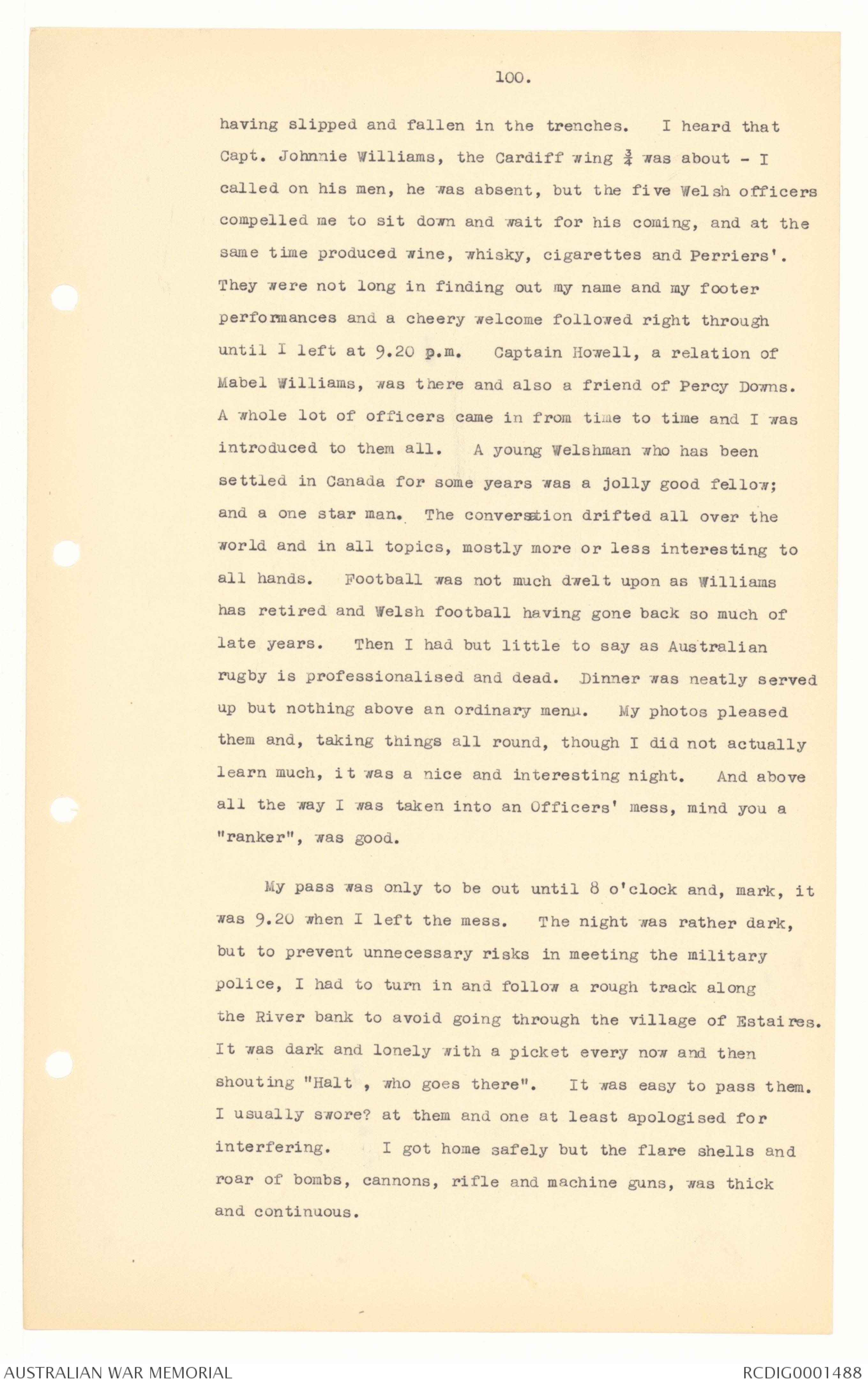
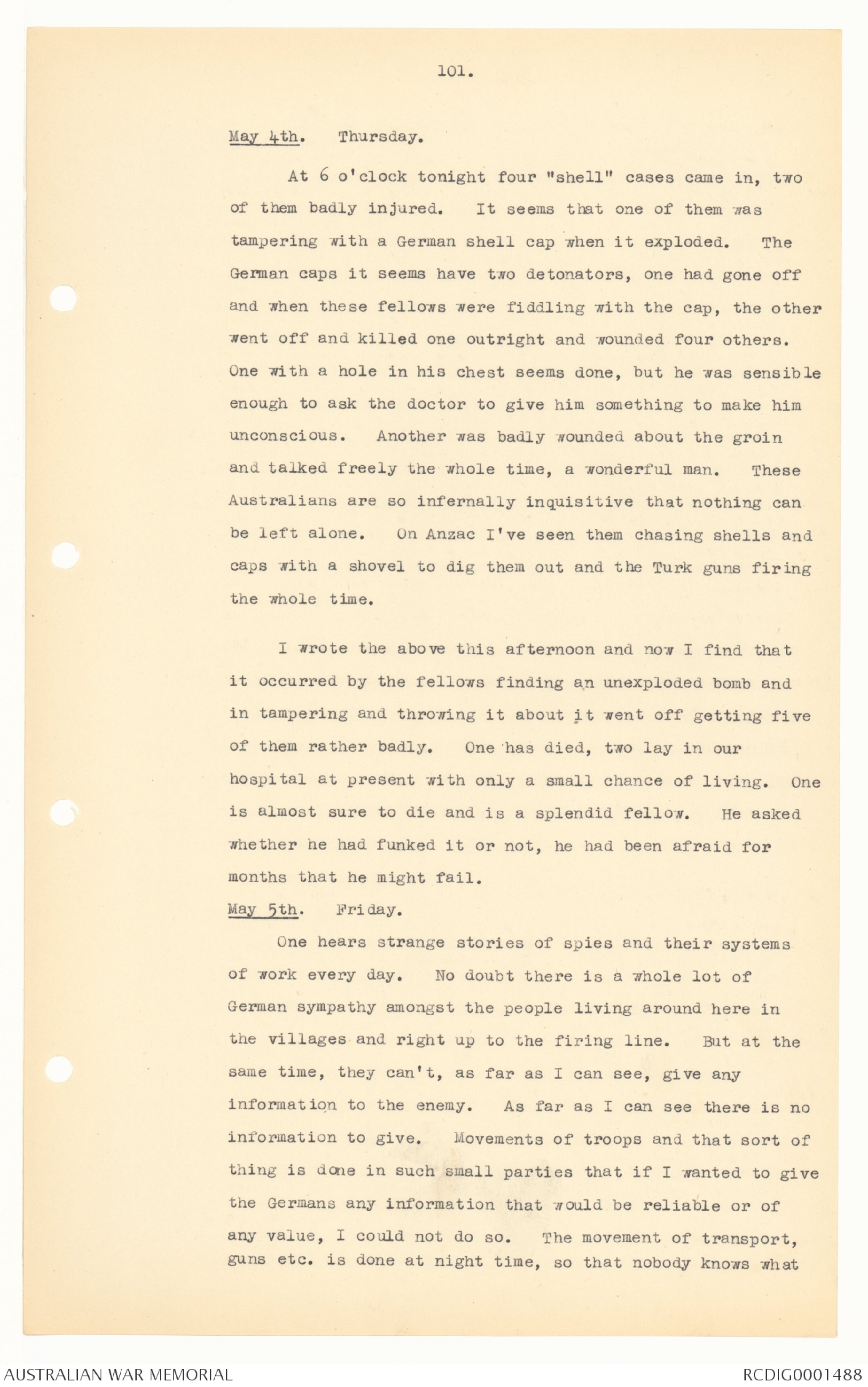
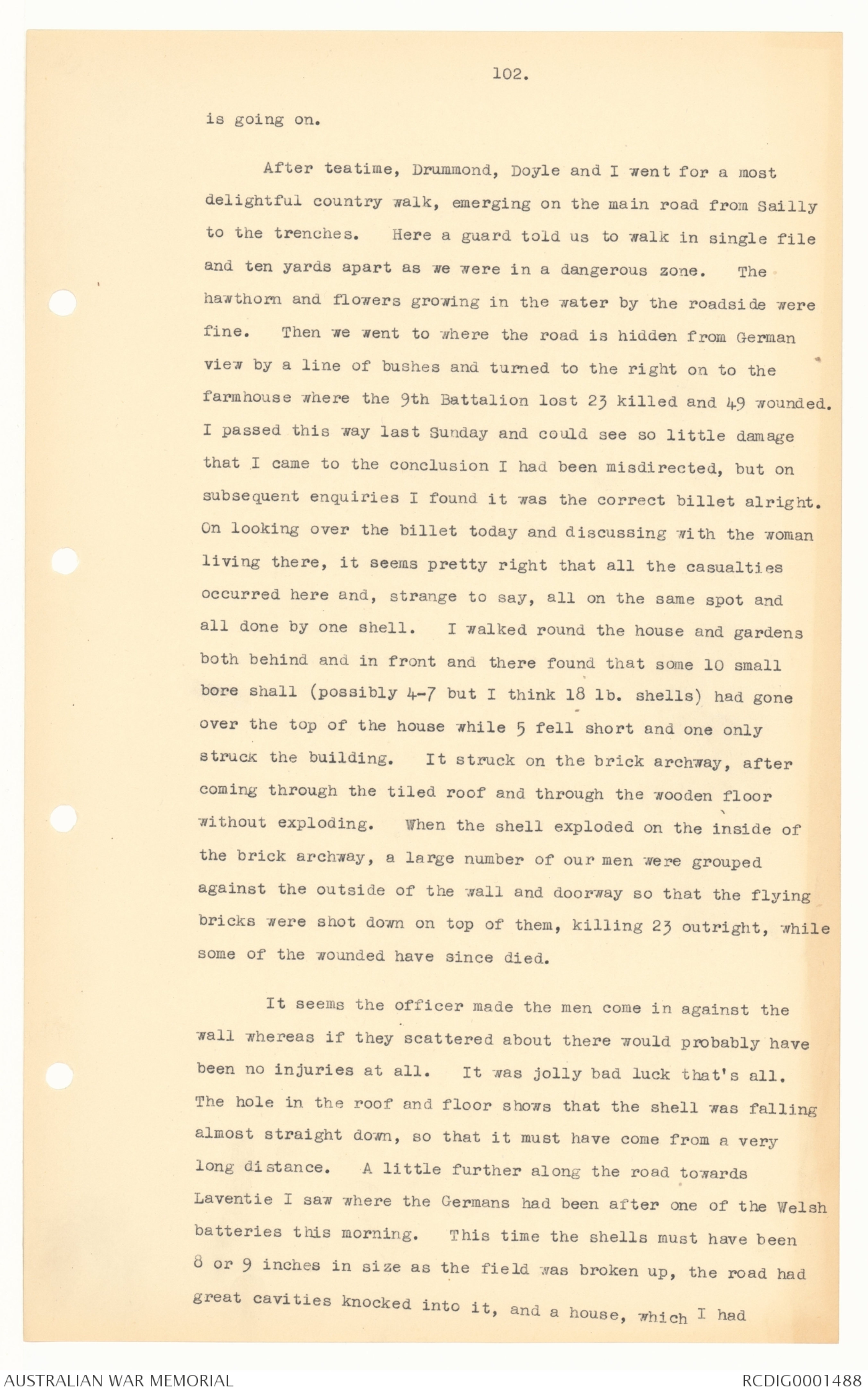
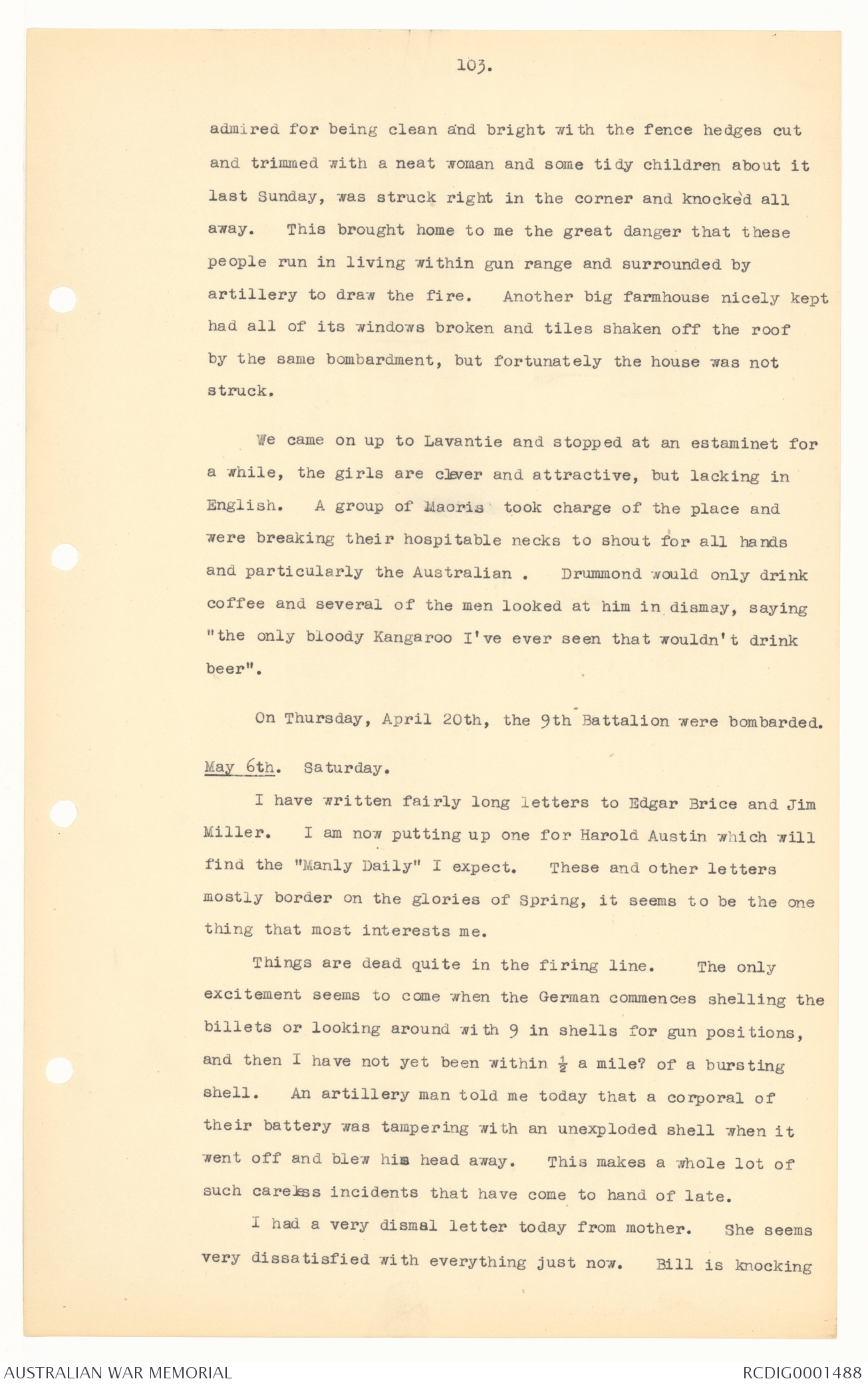
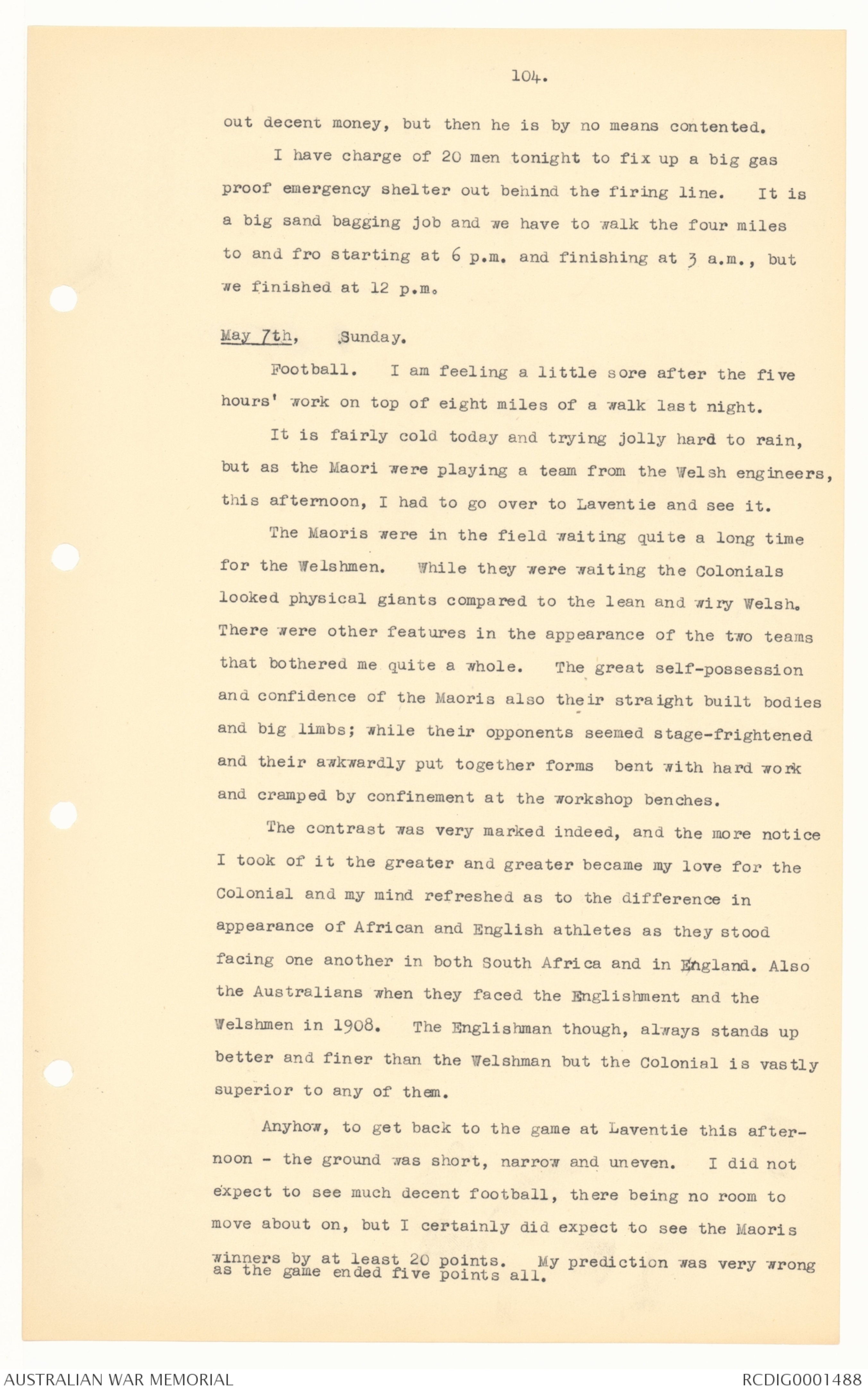
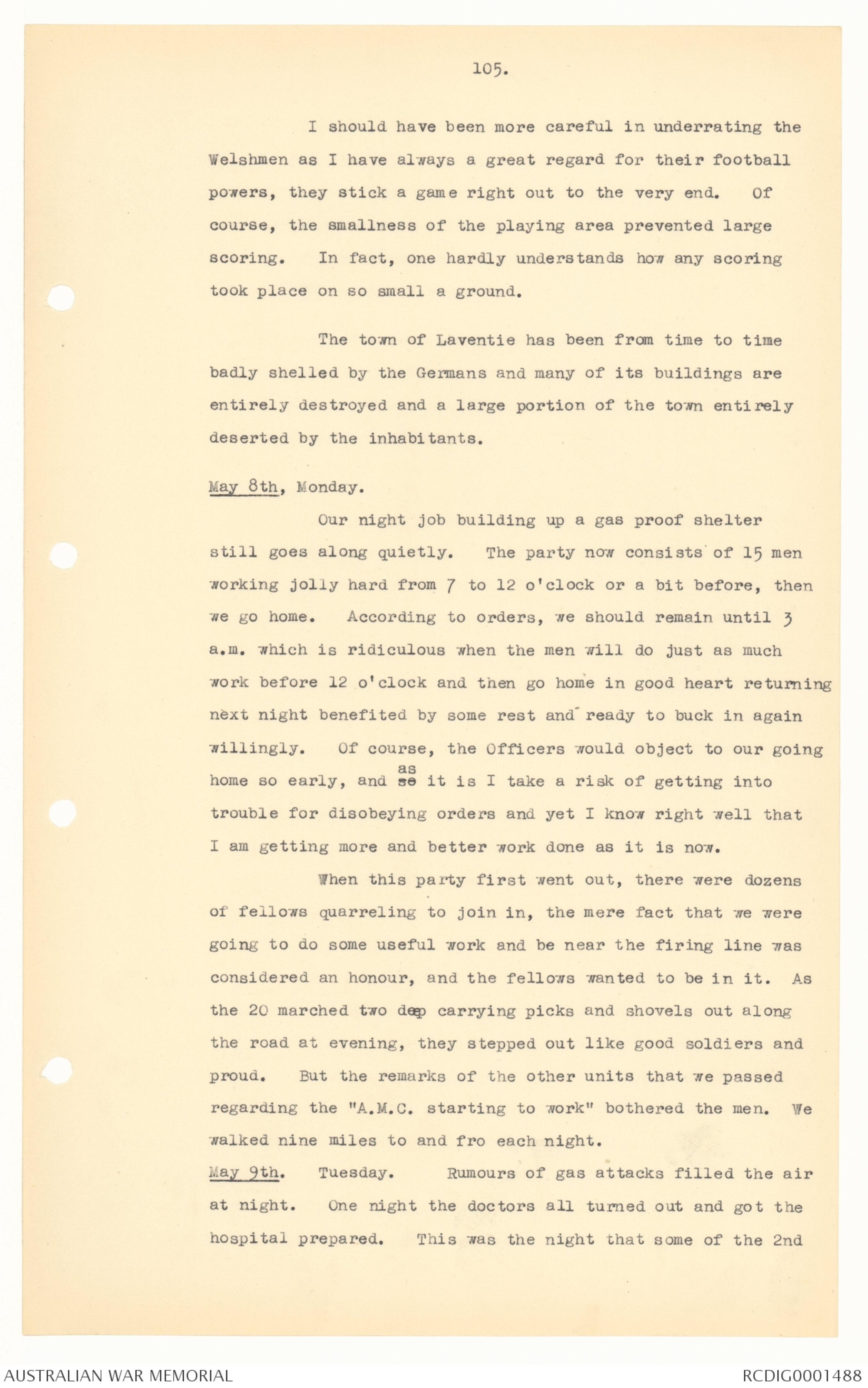
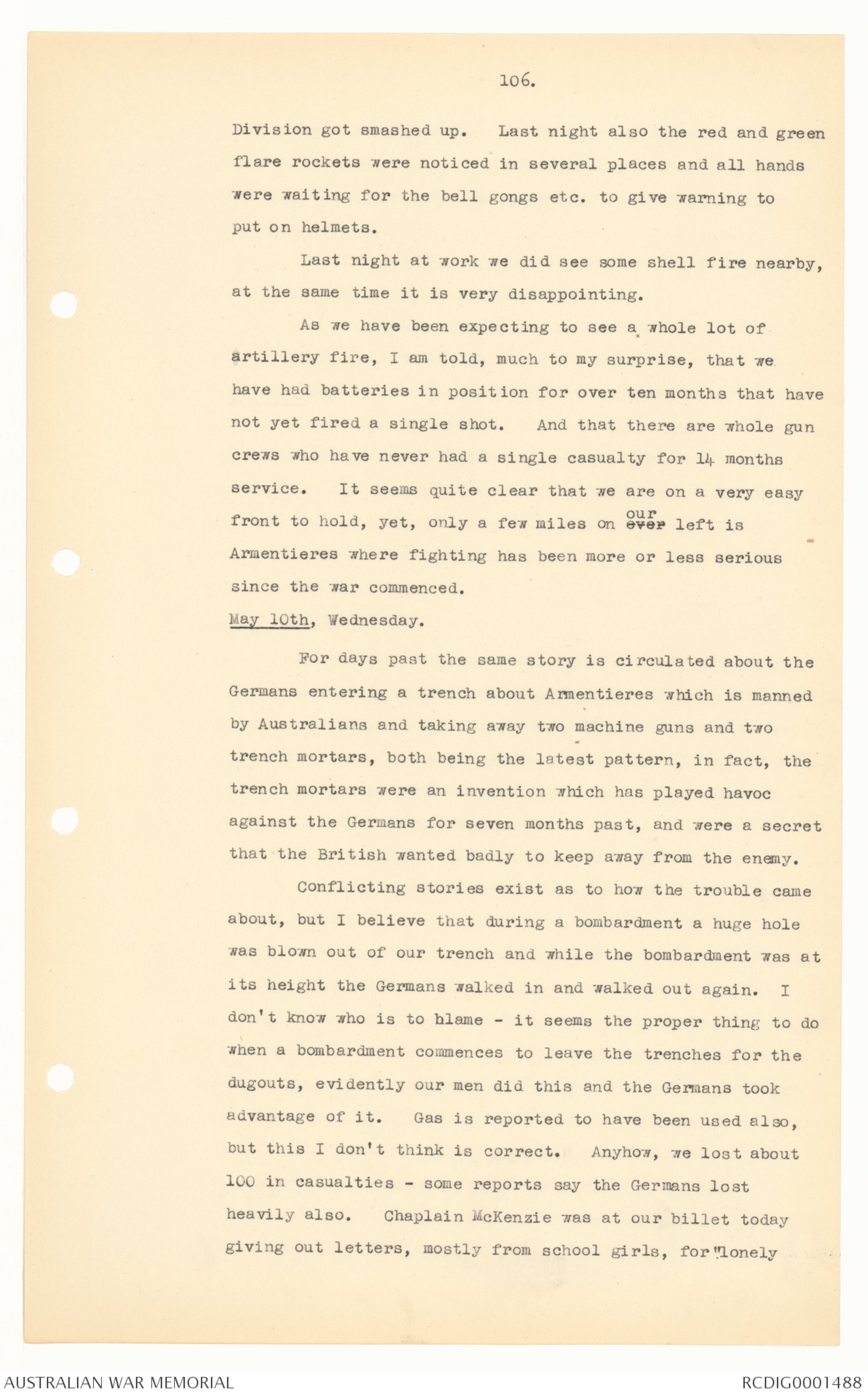
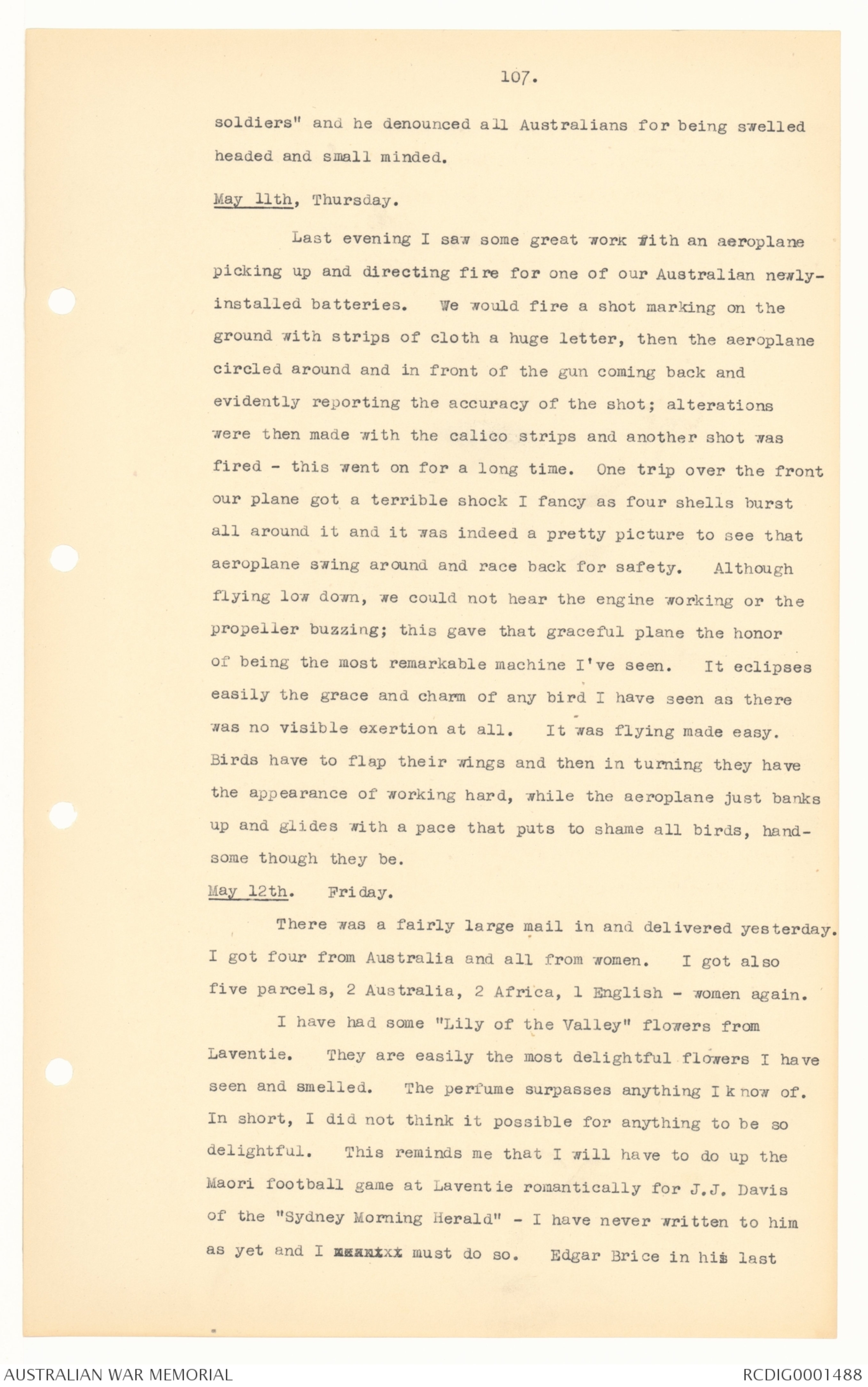
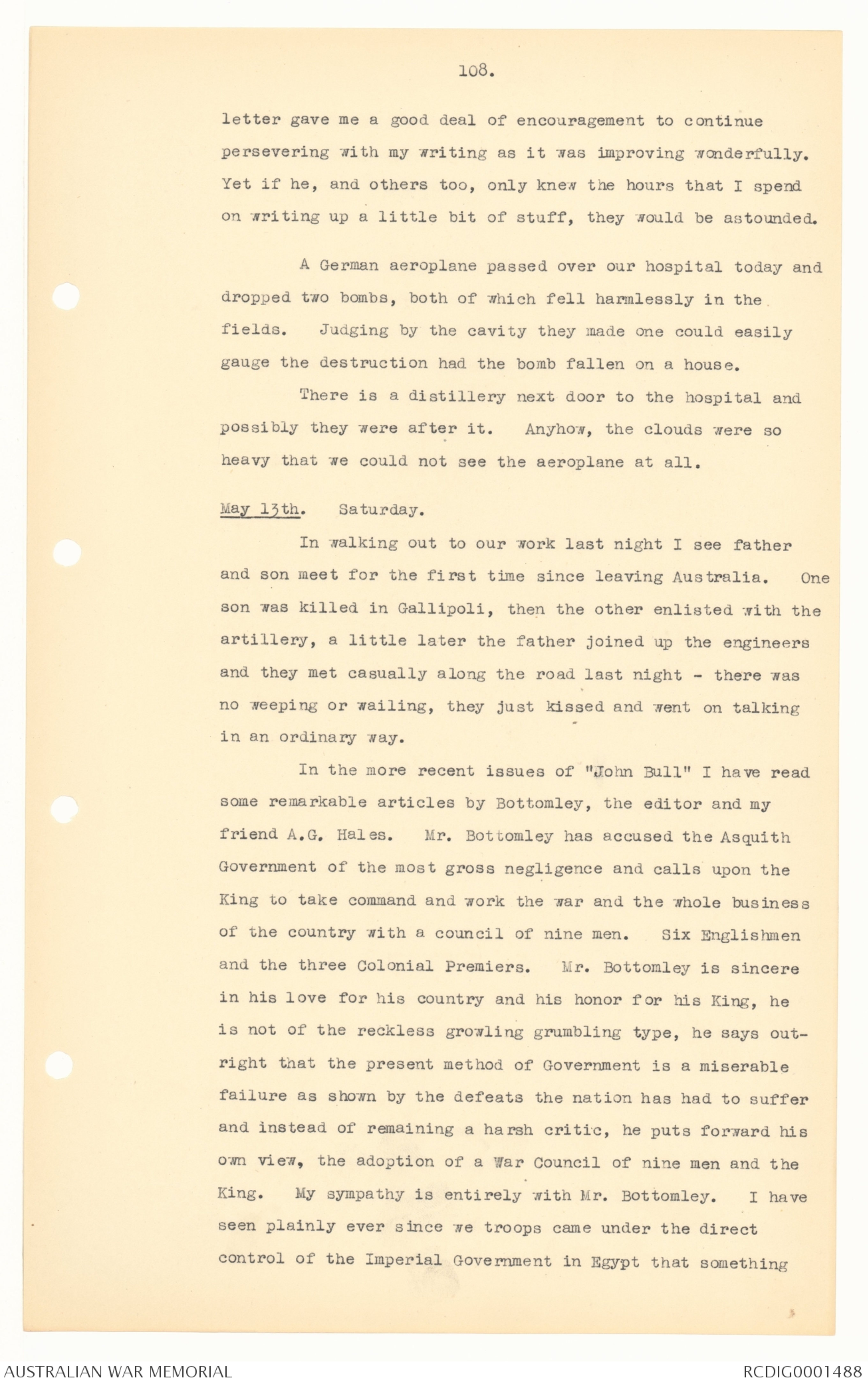
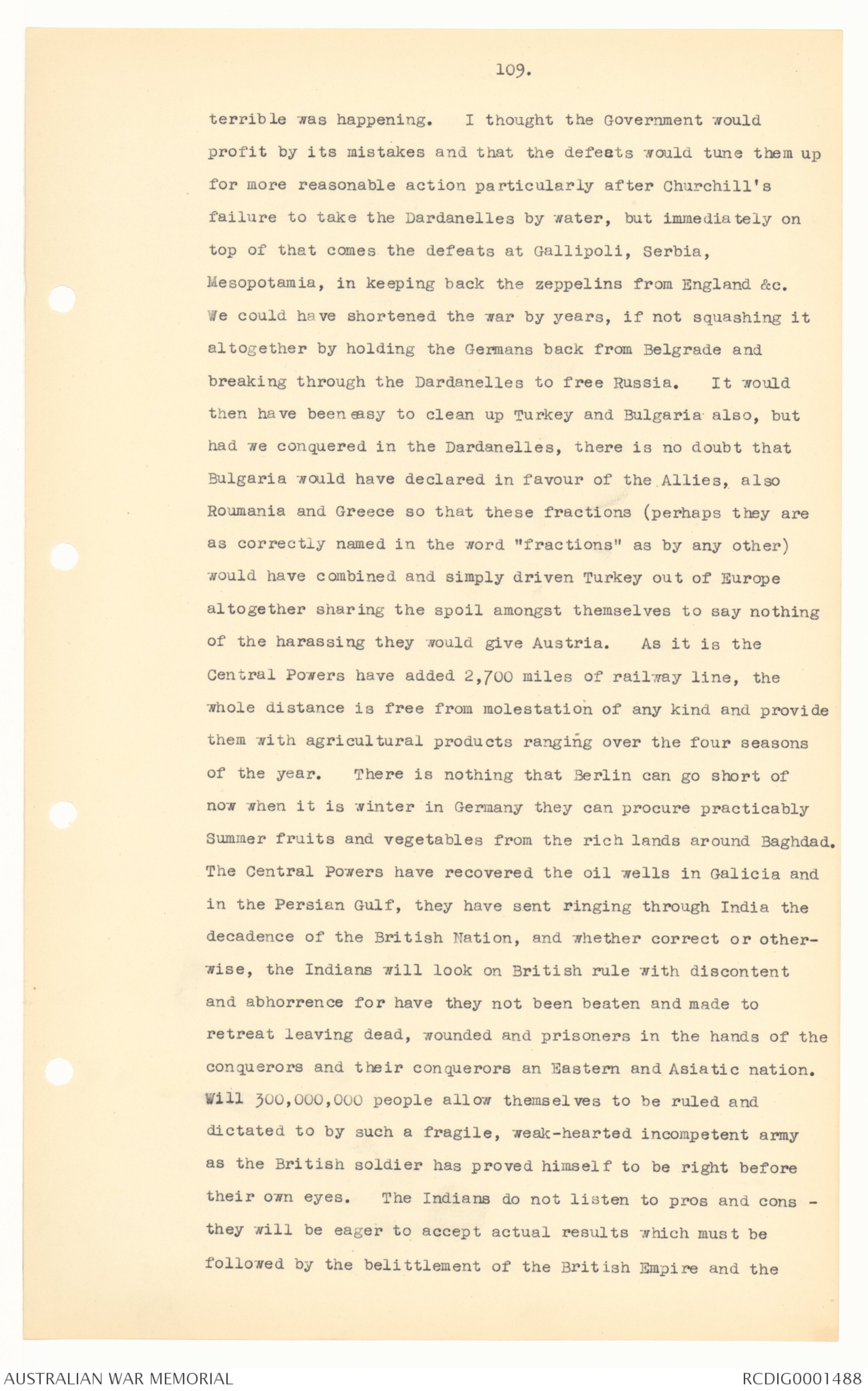
100.
having slipped and fallen in the trenches. I heard that
Capt. Johnnie Williams, the Cardiff wing ¾ was about - I
called on his men, he was absent, but the five Welsh officers
compelled me to sit down and wait for his coming, and at the
same time produced wine, whisky, cigarettes and Perriers'.
They were not long in finding out my name and my footer
performances and a cheery welcome followed right through
until I left at 9.20 p.m. Captain Howell, a relation of
Mabel Williams, was there and also a friend of Percy Downs.
A whole lot of officers came in from time to time and I was
introduced to them all. A young Welshman who has been
settled in Canada for some years was a jolly good fellow;
and a one star man. The conversation drifted all over the
world and in all topics, mostly more or less interesting to
all hands. Football was not much dwelt upon as Williams
has retired and Welsh football having gone back so much of
late years. Then I had but little to say as Australian
rugby is professionalised and dead. Dinner was neatly served
up but nothing above an ordinary menu. My photos pleased
them and, taking things all round, though I did not actually
learn much, it was a nice and interesting night. And above
all the way I was taken into an Officers' mess, mind you a
"ranker", was good.
My pass was only to be out until 8 o'clock and, mark, it
was 9.20 when I left the mess. The night was rather dark,
but to prevent unnecessary risks in meeting the military
police, I had to turn in and follow a rough track along
the River bank to avoid going through the village of Estaires.
It was dark and lonely with a picket every now and then
shouting "Halt, who goes there". It was easy to pass them.
I usually swore? at them and one at least apologised for
interfering. I got home safely but the flare shells and
roar of bombs, cannons, rifle and machine guns, was thick
and continuous.
101.
May 4th. Thursday.
At 6 o'clock tonight four "shell" cases came in, two
of them badly injured. It seems that one of them was
tampering with a German shell cap when it exploded. The
German caps it seems have two detonators, one had gone off
and when these fellows were fiddling with the cap, the other
went off and killed one outright and wounded four others.
One with a hole in his chest seems done, but he was sensible
enough to ask the doctor to give him something to make him
unconscious. Another was badly wounded about the groin
and talked freely the whole time, a wonderful man. These
Australians are so infernally inquisitive that nothing can
be left alone. On Anzac I've seen them chasing shells and
caps with a shovel to dig them out and the Turk guns firing
the whole time.
I wrote the above this afternoon and now I find that
it occurred by the fellows finding an unexploded bomb and
in tampering and throwing it about it went off getting five
of them rather badly. One has died, two lay in our
hospital at present with only a small chance of living. One
is almost sure to die and is a splendid fellow. He asked
whether he had funked it or not, he had been afraid for
months that he might fail.
May 5th. Friday.
One hears strange stories of spies and their systems
of work every day. No doubt there is a whole lot of
German sympathy amongst the people living around here in
the villages and right up to the firing line. But at the
same time, they can't, as far as I can see, give any
information to the enemy. As far as I can see there is no
information to give. Movements of troops and that sort of
thing is done in such small parties that if I wanted to give
the Germans any information that would be reliable or of
any value, I could not do so. The movement of transport,
guns etc. is done at night time, so that nobody knows what
102.
is going on.
After teatime, Drummond, Doyle and I went for a most
delightful country walk, emerging on the main road from Sailly
to the trenches. Here a guard told us to walk in single file
and ten yards apart as we were in a dangerous zone. The
hawthorn and flowers growing in the water by the roadside were
fine. Then we went to where the road is hidden from German
view by a line of bushes and turned to the right on to the
farmhouse where the 9th Battalion lost 23 killed and 49 wounded.
I passed this way last Sunday and could see so little damage
that I came to the conclusion I had been misdirected, but on
subsequent enquiries I found it was the correct billet alright.
On looking over the billet today and discussing with the woman
living there, it seems pretty right that all the casualties
occurred here and, strange to say, all on the same spot and
all done by one shell. I walked round the house and gardens
both behind and in front and there found that some 10 small
bore shall (possibly 4-7 but I think 18 lb. shells) had gone
over the top of the house while 5 fell short and one only
struck the building. It struck on the brick archway, after
coming through the tiled roof and through the wooden floor
without exploding. When the shell exploded on the inside of
the brick archway, a large number of our men were grouped
against the outside of the wall and doorway so that the flying
bricks were shot down on top of them, killing 23 outright, while
some of the wounded have since died.
It seems the officer made the men come in against the
wall whereas if they scattered about there would probably have
been no injuries at all. It was jolly bad luck that's all.
The hole in the roof and floor shows that the shell was falling
almost straight down, so that it must have come from a very
long distance. A little further along the road towards
Laventie I saw where the Germans had been after one of the Welsh
batteries this morning. This time the shells must have been
8 or 9 inches in size as the field was broken up, the road had
great cavities knocked into it, and a house, which I had
103.
admired for being clean and bright with the fence hedges cut
and trimmed with a neat woman and some tidy children about it
last Sunday, was struck right in the corner and knocked all
away. This brought home to me the great danger that these
people run in living within gun range and surrounded by
artillery to draw the fire. Another big farmhouse nicely kept
had all of its windows broken and tiles shaken off the roof
by the same bombardment, but fortunately the house was not
struck.
We came on up to Lavantie and stopped at an estaminet for
a while, the girls are clever and attractive, but lacking in
English. A group of Maoris' took charge of the place and
were breaking their hospitable necks to shout for all hands
and particularly the Australian. Drummond would only drink
coffee and several of the men looked at him in dismay, saying
"the only bloody Kangaroo I've ever seen that wouldn't drink
beer".
On Thursday, April 20th, the 9th Battalion were bombarded.
May 6th. Saturday.
I have written fairly long letters to Edgar Brice and Jim
Miller. I am now putting up one for Harold Austin which will
find the "Manly Daily" I expect. These and other letters
mostly border on the glories of Spring, it seems to be the one
thing that most interests me.
Things are dead quite in the firing line. The only
excitement seems to come when the German commences shelling the
billets or looking around with 9 in shells for gun positions,
and then I have not yet been within 1/2 a mile? of a bursting
shell. An artillery man told me today that a corporal of
their battery was tampering with an unexploded shell when it
went off and blew his head away. This makes a whole lot of
such careless incidents that have come to hand of late.
I had a very dismal letter today from mother. She seems
very dissatisfied with everything just now. Bill is knocking
104.
out decent money, but then he is by no means contented.
I have charge of 20 men tonight to fix up a big gas
proof emergency shelter out behind the firing line. It is
a big sand bagging job and we have to walk the four miles
to and fro starting at 6 p.m. and finishing at 3 a.m., but
we finished at 12 p.m.
May 7th. Sunday.
Football. I am feeling a little sore after the five
hours' work on top of eight miles of a walk last night.
It is fairly cold today and trying jolly hard to rain,
but as the Maori were playing a team from the Welsh engineers,
this afternoon, I had to go over to Laventie and see it.
The Maoris were in the field waiting quite a long time
for the Welshmen. While they were waiting the Colonials
looked physical giants compared to the lean and wiry Welsh.
There were other features in the appearance of the two teams
that bothered me quite a whole. The great self-possession
and confidence of the Maoris also their straight built bodies
and big limbs; while their opponents seemed stage-frightened
and their awkwardly put together forms, bent with hard work
and cramped by confinement at the workshop benches.
The contrast was very marked indeed, and the more notice
I took of it the greater and greater became my love for the
Colonial and my mind refreshed as to the difference in
appearance of African and English athletes as they stood
facing one another in both South Africa and in England. Also
the Australians when they faced the Englishment and the
Welshmen in 1908. The Englishman though, always stands up
better and finer than the Welshman but the Colonial is vastly
superior to any of them.
Anyhow, to get back to the game at Laventie this afternoon
- the ground was short, narrow and uneven. I did not
expect to see much decent football, there being no room to
move about on, but I certainly did expect to see the Maoris
winners by at least 20 points. My prediction was very wrong
as the game ended five points all.
105.
I should have been more careful in underrating the
Welshmen as I have always a great regard for their football
powers, they stick a game right out to the very end. Of
course, the smallness of the playing area prevented large
scoring. In fact, one hardly understands how any scoring
took place on so small a ground.
The town of Laventie has been from time to time
badly shelled by the Germans and many of its buildings are
entirely destroyed and a large portion of the town entirely
deserted by the inhabitants.
May 8th. Monday.
Our night job building up a gas proof shelter
still goes along quietly. The party now consists of 15 men
working jolly hard from 7 to 12 o'clock or a bit before, then
we go home. According to orders, we should remain until 3
a.m. which is ridiculous when the men will do just as much
work before 12 o'clock and then go home in good heart returning
next night benefited by some rest and ready to buck in again
willingly. Of course, the Officers would object to our going
home so early, and so as it is I take a risk of getting into
trouble for disobeying orders and yet I know right well that
I am getting more and better work done as it is now.
When this party first went out, there were dozens
of fellows quarreling to join in, the mere fact that we were
going to do some useful work and be near the firing line was
considered an honour, and the fellows wanted to be in it. As
the 20 marched two deep carrying picks and shovels out along
the road at evening, they stepped out like good soldiers and
proud. But the remarks of the other units that we passed
regarding the "A.M.C. starting to work" bothered the men. We
walked nine miles to and fro each night.
May 9th. Tuesday. Rumours of gas attacks filled the air
at night. One night the doctors all turned out and got the
hospital prepared. This was the night that some of the 2nd
106.
Division got smashed up. Last night also the red and green
flare rockets were noticed in several places and all hands
were waiting for the bell gongs etc. to give warning to
put on helmets.
Last night at work we did see some shell fire nearby,
at the same time it is very disappointing.
As we have been expecting to see a whole lot of
artillery fire, I am told, much to my surprise, that we
have had batteries in position for over ten months that have
not yet fired a single shot. And that there are whole gun
crews who have never had a single casualty for 14 months
service. It seems quite clear that we are on a very easy
front to hold, yet, only a few miles on ever our left is
Armentieres where fighting has been more or less serious
since the war commenced.
May 10th. Wednesday.
For days past the same story is circulated about the
Germans entering a trench about Armentieres which is manned
by Australians and taking away two machine guns and two
trench mortars, both being the latest pattern, in fact, the
trench mortars were an invention which has played havoc
against the Germans for seven months past, and were a secret
that the British wanted badly to keep away from the enemy.
Conflicting stories exist as to how the trouble came
about, but I believe that during a bombardment a huge hole
was blown out of our trench and while the bombardment was at
its height the Germans walked in and walked out again. I
don't know who is to blame - it seems the proper thing to do
when a bombardment commences to leave the trenches for the
dugouts, evidently our men did this and the Germans took
advantage of it. Gas is reported to have been used also,
but this I don't think is correct. Anyhow, we lost about
100 in casualties - some reports say the Germans lost
heavily also. Chaplain McKenzie was at our billet today
giving out letters, mostly from school girls, for "lonely
107.
soldiers" and he denounced all Australians for being swelled
headed and small minded.
May 11th. Thursday.
Last evening I saw some great work with an aeroplane
picking up and directing fire for one of our Australian newly-
installed batteries. We would fire a shot marking on the
ground with strips of cloth a huge letter, then the aeroplane
circled around and in front of the gun coming back and
evidently reporting the accuracy of the shot; alterations
were then made with the calico strips and another shot was
fired - this went on for a long time. One trip over the front
our plane got a terrible shock I fancy as four shells burst
all around it and it was indeed a pretty picture to see that
aeroplane swing around and race back for safety. Although
flying low down, we could not hear the engine working or the
propeller buzzing; this gave that graceful plane the honor
of being the most remarkable machine I've seen. It eclipses
easily the grace and charm of any bird I have seen as there
was no visible exertion at all. It was flying made easy.
Birds have to flap their wings and then in turning they have
the appearance of working hard, while the aeroplane just banks
up and glides with a pace that puts to shame all birds, hand-
some though they be.
May 12th. Friday.
There was a fairly large mail in and delivered yesterday.
I got four from Australia and all from women. I got also
five parcels, 2 Australia, 2 Africa, 1 English - women again.
I have had some "Lily of the Valley" flowers from
Laventie. They are easily the most delightful flowers I have
seen and smelled. The perfume surpasses anything I know of.
In short, I did not think it possible for anything to be so
delightful. This reminds me that I will have to do up the
Maori football game at Laventie romantically for J.J. Davis
of the "Sydney Morning Herald" - I have never written to him
as yet and I xxxxxxx must do so. Edgar Brice in his last
108.
letter gave me a good deal of encouragement to continue
persevering with my writing as it was improving wonderfully.
Yet if he, and others too, only knew the hours that I spend
on writing up a little bit of stuff, they would be astounded.
A German aeroplane passed over our hospital today and
dropped two bombs, both of which fell harmlessly in the
fields. Judging by the cavity they made one could easily
gauge the destruction had the bomb fallen on a house.
There is a distillery next door to the hospital and
possibly they were after it. Anyhow, the clouds were so
heavy that we could not see the aeroplane at all.
May 13th. Saturday.
In walking out to our work last night I see father
and son meet for the first time since leaving Australia. One
son was killed in Gallipoli, then the other enlisted with the
artillery, a little later the father joined up the engineers
and they met casually along the road last night - there was
no weeping or wailing, they just kissed and went on talking
in an ordinary way.
In the more recent issues of "John Bull" I have read
some remarkable articles by Bottomley, the editor and my
friend A.G. Hales. Mr. Bottomley has accused the Asquith
Government of the most gross negligence and calls upon the
King to take command and work the war and the whole business
of the country with a council of nine men. Six Englishmen
and the three Colonial Premiers. Mr. Bottomley is sincere
in his love for his country and his honor for his King, he
is not of the reckless growling grumbling type, he says outright
that the present method of Government is a miserable
failure as shown by the defeats the nation has had to suffer
and instead of remaining a harsh critic, he puts forward his
own view, the adoption of a War Council of nine men and the
King.. My sympathy is entirely with Mr. Bottomley. I have
seen plainly ever since we troops came under the direct
control of the Imperial Government in Egypt that something
109.
terrible was happening. I thought the Government would
profit by its mistakes and that the defeats would tune them up
for more reasonable action particularly after Churchill's
failure to take the Dardanelles by water, but immediately on
top of that comes the defeats at Gallipoli, Serbia,
Mesopotamia, in keeping back the zeppelins from England &c.
We could have shortened the war by years, if not squashing it
altogether by holding the Germans back from Belgrade and
breaking through the Dardanelles to free Russia. It would
then have been easy to clean up Turkey and Bulgaria also, but
had we conquered in the Dardanelles, there is no doubt that
Bulgaria would have declared in favour of the Allies, also
Roumania and Greece so that these fractions (perhaps they are
as correctly named in the word "fractions" as by any other)
would have combined and simply driven Turkey out of Europe
altogether sharing the spoil amongst themselves to say nothing
of the harassing they would give Austria. As it is the
Central Powers have added 2,700 miles of railway line, the
whole distance is free from molestation of any kind and provide
them with agricultural products ranging over the four seasons
of the year. There is nothing that Berlin can go short of
now when it is winter in Germany they can procure practicably
Summer fruits and vegetables from the rich lands around Baghdad.
The Central Powers have recovered the oil wells in Galicia and
in the Persian Gulf, they have sent ringing through India the
decadence of the British Nation, and whether correct or otherwise,
the Indians will look on British rule with discontent
and abhorrence for have they not been beaten and made to
retreat leaving dead, wounded and prisoners in the hands of the
conquerors and their conquerors an Eastern and Asiatic nation.
will 300,000,000 people allow themselves to be ruled and
dictated to by such a fragile, weak-hearted incompetent army
as the British soldier has proved himself to be right before
their own eyes. The Indians do not listen to pros and cons -
they will be eager to accept actual results which must be
followed by the belittlement of the British Empire and the
 Sandy Mudie
Sandy MudieThis transcription item is now locked to you for editing. To release the lock either Save your changes or Cancel.
This lock will be automatically released after 60 minutes of inactivity.